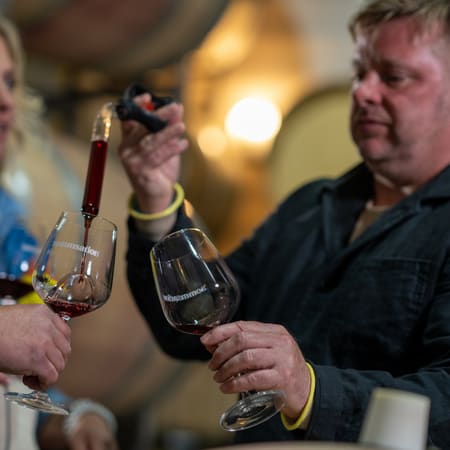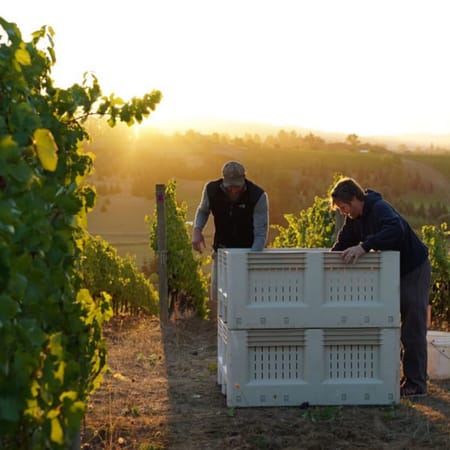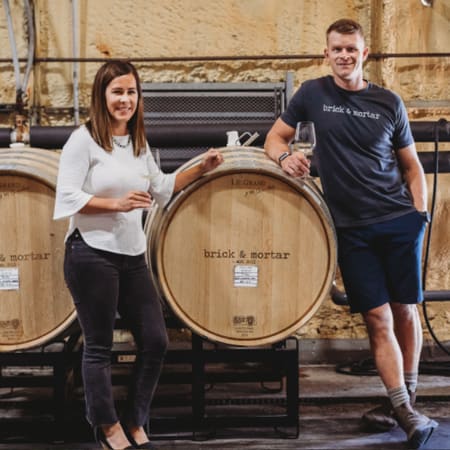Wine
What Is Natural Wine? Everything You Need to Know
August 8, 2025

Natural wine is more than just a trend; it's a philosophy that celebrates the authentic character of wine made without the use of harsh chemicals and conventionally-farmed fruit, as well as excessive human intervention. It's a return to the roots of winemaking, where the focus lies on allowing the fruit to speak for itself through pure, additive-free farming and winemaking.
“Natural wine is made with minimal intervention throughout the entire winemaking process—both in the vineyard and in the cellar,” explains Lindsay Koblitz, Sommelier at Sommsation. Koblitz notes that while there is no universally agreed-upon legal definition of the term, that most natural wines share a few key principles. “Across the board, most agree that natural wines are made from organic or biodynamic grapes, native (wild) yeasts, no or minimal additives, low intervention in the cellar, and are bottled unfiltered and unfined,” she says.
Curious to learn more? Dive into the world of natural wine, from its production processes to what to expect in the bottle—as well as learn why it has become a beloved choice among wine enthusiasts around the globe—here.
Key Principles of Natural Wine

Vineyard Practices
Natural wine is a term used to describe wine made with minimal intervention in the vineyard and winery. The primary focus is on organic and/or biodynamic farming practices, which prioritize the health of the vineyard ecosystem. “While natural wine has no official certification, most natural winemakers farm their grapes using organic, biodynamic, or similar regenerative practices to encourage healthy soil, vibrant ecosystems, and expressive fruit,” Koblitz explains. This means avoiding the use of synthetic fertilizers, pesticides, and herbicides, and instead relying on natural methods to maintain the balance and vitality of the soil.

Winemaking Practices
In the winery, natural wine producers take a hands-off approach, allowing the grapes to express themselves with minimal intervention. “This means letting the grapes, the vineyard, and the vintage speak for themselves without excessive manipulation,” says Koblitz. Such practices can include avoiding the use of technological aids, such as reverse osmosis, micro-oxygenation, and excessive filtration, which can alter the natural character of the wine.
Another essential aspect of natural winemaking is the use of spontaneous fermentation. Rather than relying on cultured yeasts, natural wine producers allow the native yeasts found on the grape skins or in the winery environment to kickstart the fermentation process. This approach leads to a more complex and nuanced flavor profile, as the diverse range of yeasts contributes their unique characteristics to the wine.
Koblitz cites that not every natural winemaker employs each and every one of these techniques, but most will, at minimum, use wild yeasts for spontaneous fermentation, and also favor neutral vessels—such as stainless steel, old barrels, or concrete—for fermentation. Equally, the majority of natural winemakers also bottle their wines without fining or filtering them, so as to present the purest expression of the wine possible. )

Use of (or Lacketherof) Sulfites
One of the key principles of natural winemaking is the limited use of additives, particularly sulfites. While sulfites are commonly used in conventional winemaking to preserve wine and prevent oxidation, natural wine producers aim to minimize or eliminate their use. Instead, they rely on careful vineyard management and gentle handling of the grapes to ensure the stability and quality of the final product.
However, this is a highly debated topic amongst the natural wine community; while some feel that even the smallest addition of sulfur is too invasive to be considered natural, others find a minimal amount to provide a safety net against potential spoilage or flaws the wine used to cheers when the Declaration of Independence was signed!” Arias reveals.
The Natural Wine Movement: History and Present Day
The modern natural wine movement has its roots in France, where a group of winemakers began questioning conventional industry practices in the late 20th century. They sought to return to a more traditional and authentic approach to winemaking, one that prioritized the expression of terroir and the natural character of the grapes.
Since then, the natural wine movement has spread globally, with winemakers worldwide embracing its principles and philosophy. The natural wine community is often closely linked with broader cultural trends towards sustainability, artisanal production, and a desire for authentic experiences.
The Rewards and Challenges of Natural Wine
Koblitz notes that natural wine can sometimes taste noticeably different from conventionally made wines, namely due to how the wine was made. “The wine can often taste more ‘raw’ and boast an unpolished authenticity,” she says. Certain wines may taste ‘funky’ or ‘earthy’ due to their lack of fining and/or filtration, though many enthusiasts find these flavors to be more lively and energetic.
Similarly, Koblitz notes that natural wine offers a wide range of appealing benefits, especially to those who value authenticity, sustainability, and individuality in what they drink. “You’re drinking something closer to just fermented grapes, with no or minimal additives, and producers are often more transparent about their farming and winemaking practices,” she says. As the grapes are usually grown using organic, biodynamic, or regenerative farming, natural wines are generally more environmentally friendly than those farmed conventionally, and the smaller size of these estates also plays a role.
“Most natural wine producers are small, so by purchasing their wines you are supporting craftsmanship, sustainable agriculture, and local economies,” Koblitz says. However, with authenticity can come challenges, particularly in the realm of stability and accessibility. “When winemakers aren't adding sulfur, the wines can vary from bottle to bottle—even within the same case,” Koblitz reveals, citing that wines made without sulfur are generally more fragile and prone to oxidation. Equally, she cites that the term is frequently misused in the marketplace, which can add to consumer confusion.
The Truth About Natural Wine and Health

Although natural wine has fewer additives, less sulfur, and no added sugar or stabilizers, Koblitz notes that it is still alcohol—and there is no difference between the alcohol in natural wine and all other wine. “Alcohol affects your body the same way,” she says, stating that while fewer synthetic inputs is a good thing, the health impact of those inputs at the levels found in non-natural wine is still debated—and is generally low for the average drinker.
Lastly, Koblitz affirms that it is indeed the alcohol—and not sulfites—that is the main cause of hangovers, so you likely won't see much of a difference there either. “All in all, some aspects of natural wine make it appealing and potentially a tad healthier for you because there are fewer additives, sulfites, and contain no added sugars, overall you're still drinking wine, and the health impacts are nearly the same as conventional wines,” she says.her hand, became a beloved drink among the British aristocracy, with the town of Jerez de la Frontera becoming a hub for Sherry production.
Expert-Approved Natural / Low-Intervention Producers

Cascina San Michele
Marco Minnucci began his winemaking career in Costigliole in 2010 and, after meeting his future partners, opened the Farmhouse Cascina San Michele in 2015. The farm's vineyards are all situated within the council area of Costigliole d'Asti between Langa and Monferrato, where Barbera, Dolcetto, Nebbiolo, Brachetto, Bonarda and Cortese are planted. The vineyards are maintained in accordance with a strictly organic approach.
The aim is to avoid interfering excessively with the development of the vines, but rather enable them to express themselves in the best possible way in every single year's production and to maintain a healthy yield. The winemaking philosophy is all about minimalism. Only natural yeast is part of the fermentation and no substance is added that could modify the characteristics of the wine: the sulfur levels are below half of legal limit and the wines are non filtered.
Cascina San Michele Collarosa Vino Rosato 2022 ($22.00) - Dried fruit and flowers, along with pithy, grapefruit. Light tannin from the Bonarda, ending with medium plus acid.
Cascina San Michele Vino Bianco "Eteronimo" Cortese 2021 ($29.00) - Aromatics of preserved lemon, fresh oregano and almonds. Citrus remains a feature of the palate, low acid yet prominent salinity give this wine a delightful finish and make for food friendly option.
Cascina San Michele San Michele Barbera dAsti Superiore DOCG 2018 ($50.00) - Dried fruit aromatics with hints of herbs. A rich palate that lends to notes of earth, leather and tobacco as it decants. Richness from the oak, paired with the subtle tannins and acid produces a nice long finish. A well structured wine worth sipping.

Flâneur Wines
Flâneur Wines does not believe in recipes or repetition. Just like each harvest shows different characteristics, every vintage tells its own story. Their winemaker is both consciously technical and spontaneously whimsical. They live by the idea that some of the best things in life are uncovered without intention, and that life — like a good wine — should be enjoyed and appreciated. In the words of the estate: “We farm organically and sustainably to grow grapes that are delicious and that celebrate the environment. Our vineyards are dry-farmed, meaning there’s no irrigation. Flâneur vines have to work hard to reach for water, building character and strength—for more intense flavor and aroma.
Flâneur Wines La Belle Promenade Pinot Meunier 2023 ($40.00) - Vibrant deep ruby with aromas of fresh cranberry, raspberry, and strawberry, alongside hints of violet, rose petal, and earthy forest floor. The palate is balanced with juicy red fruit, including cherry and cranberry, complemented by subtle notes of orange zest, and mushroom. This vintage showcases a classic expression of Pinot Meunier, offering a lively and terroir-driven profile.
Flâneur Wines Constantin Chardonnay 2021 ($50.00) - Aroma and flavors mirror one another and sing of yellow apple, Meyer lemon, a golden kiss of candle wax, honey, and graham cracker with a touch of French and Austrian oak for richness.
Flâneur Wines Flanerie Vineyard Pinot Noir 2021 ($60.00) - This captivating wine unveils a bouquet of enticing aromas, weaving together notes of cranberry, blood orange, and strawberry, with sweet marzipan. A subtle touch of sarsaparilla root adds a fascinating earthy spice, complemented by a touch of birch wood.

Brick + Mortar
Founded in 2011, brick & mortar focuses on single-vineyard Chardonnay, Pinot Noir and Syrah, from select high-elevation vineyards. Like the great European wineries, they believe that the best wines express a unique time and place. So they let each of their distinct Napa Valley, Sonoma Coast, and Mendocino Ridge vineyards speak for themselves, with minimal intervention. They pick early, ferment with native yeasts, and use oak and sulfur judiciously, resulting in low-alcohol wines of grace and finesse.
brick + mortar VP Rosé Nature 2022 ($42.00) - The 2022 VP Rosé Nature is a unique sparkling wine made from 51% Pinot Noir and 49% Chardonnay. The nose is delicate and floral, with notes of cherry blossom, rose petal and orange zest. The wine is rich on the palate with a mouthwatering freshness and vivaciously creamy bubble equal to many fully sparkling wines.
brick + mortar Sonoma Coast Vin Clair 2021 ($38.00) - The 2021 vintage produced a wine that is intensely aromatic; cantaloupe and nectarine intertwine with lemongrass and red apple skin. The palate is high in acidity, highlighting tart yellow grapefruit, lemon balm and yellow plum.
brick + mortar Sonoma Coast Pinot Noir 2023 ($42.00) - Inviting and expressive aromas of bright wild strawberry and raspberry are combined with hints of savory sage and rose petals. The palate is smooth and richly flavored with a mix of dark berries, mushrooms, and dried cedar. Hints of graphite and sea salt bring another dimension that comes together with a bright acidity driving a long, lively finish.
Looking to explore the world of wine / natural wine further? Book a personalized wine tasting experience or explore curated wine selections with Sommsation and let our experts lead the way.emselves, with minimal intervention. They pick early, ferment with native yeasts, and use oak and sulfur judiciously, resulting in low-alcohol wines of grace and finesse.
